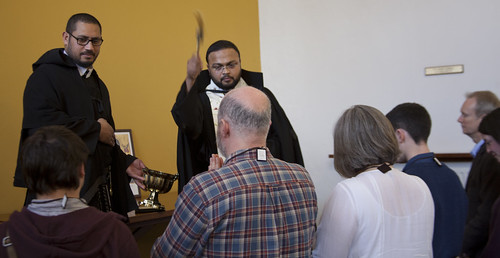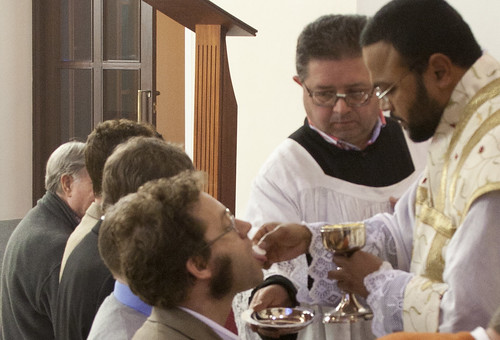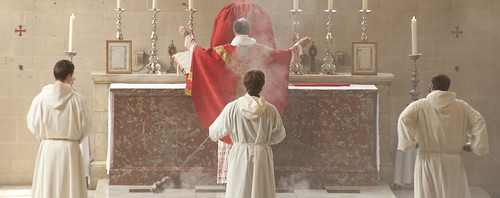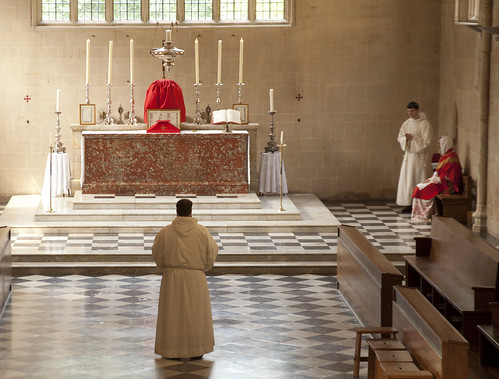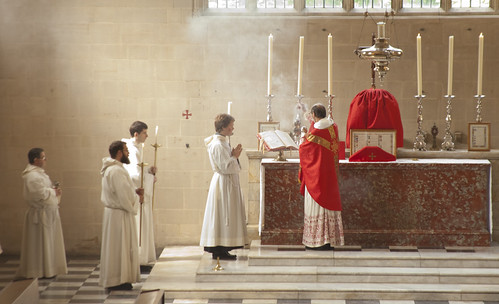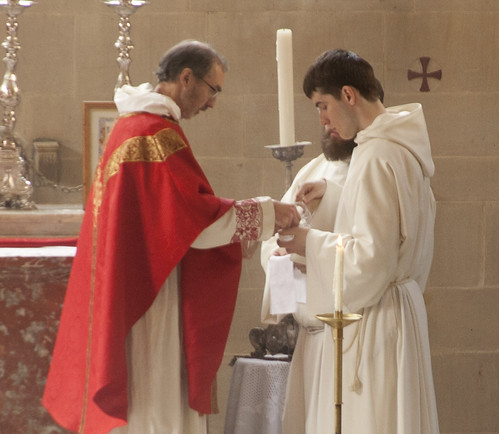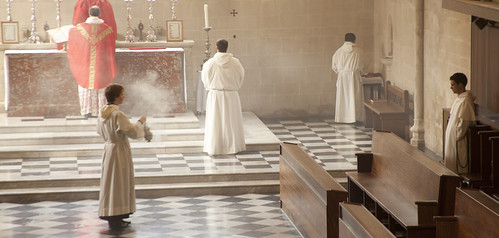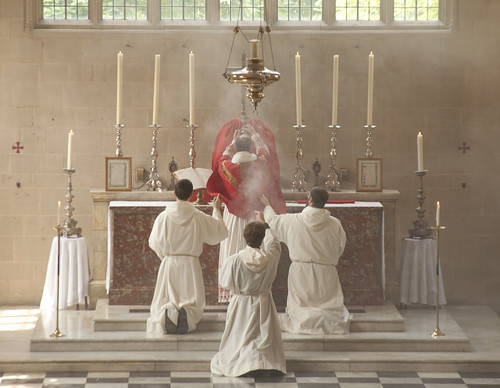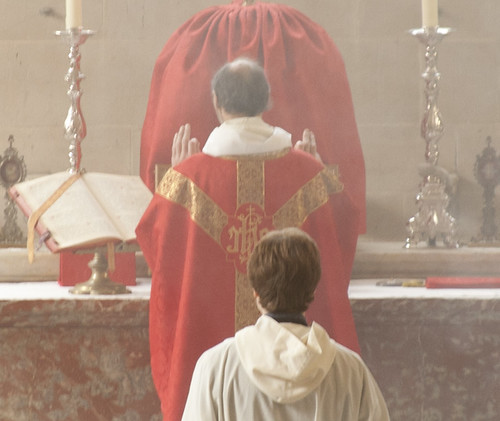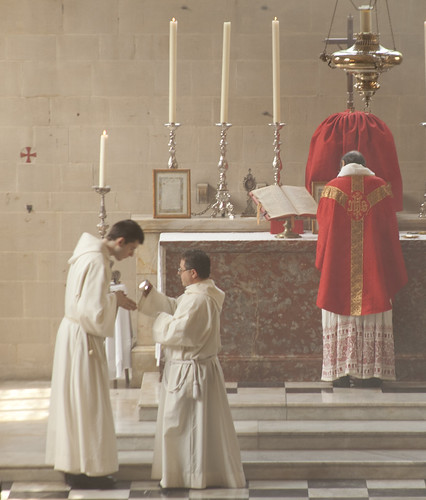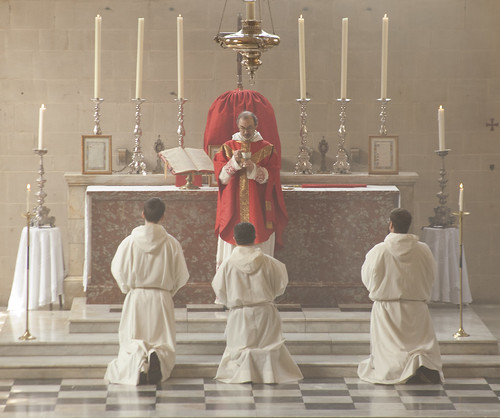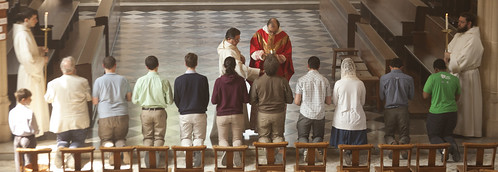Chairman's Blog
Rogue bishops and Traditional Institutes: Letter in The Tablet
Last weekend The Tablet's man in Rome, Christopher Lamb, noted that Pope Francis was taking away the prerogative of bishops to found religious institutes, orders, and communities, or at least circumscribing it, by insisting that in each case they get permission from Rome.
It sadly reflects the intellectual and journa
listic standards of The Tablet the Lamb goes on to try to make this a stick to beat the Traditional Institutes and orders, and uses the Franciscan Friars of the Immaculate to do so.
This ruling is clearly targeted at the large number of traditionalist religious orders that have sprouted up in recent years, many of them exclusively celebrating the sacraments in the pre-Vatican II Old Rite. Many of them do good work but there are suspicions about others.
Take the Franciscan Friars of the Immaculate, a traditionalist offshoot of the Franciscans, founded in Italy in 1990. The order became embroiled in an internal row over the liturgy with concerns they were becoming too exclusively traditionalist and both Benedict XVI and Francis launched inquiries into them. This Pope was particularly tough and banned them from celebrating the Old Rite liturgies without special permission, a move which angered traditionalists.
The train of thought is bizarre, because the FFI simply doesn't come into the category Lamb is trying to generalise about: it did not 'exclusively celebrate' the Traditional Mass, or even come close; it is not a foundation of 'recent years'; and it is not a diocesan institute: it was answerable directly to Rome and the Congregation for Religious, as anyone who has been following events has been all too aware.
They have, with a number of slightly irritating textual changes, published my response this weekend.
No wild growths
Christopher Lamb (View from Rome, 28 May ) notes that in future bishops will need to consult the Vatican before establishing new religious orders in their dioceses. He suggests that some problematic foundations of “recent years” have been exclusively committed to the Traditional Mass, and refers to the Franciscan Friars of the Immaculate (FFI).
Since, as the article itself notes, the FFI was founded as long ago as [in] 1990, and was not, and never had been, and was never proposed to be exclusively committed to the Traditional Mass, it is hard to see why Lamb uses the FFI as an example of this alleged phenomenon. As a matter of fact, It was not an Institute of Diocesesan Right either; it gained “pontifical” status from the Vatican in 1998, and has operated since then in more than two dozen countries. When it had been established at the diocesan level, this was done after careful consultation with Rome.
The Vatican’s involvement in the establishment of institutes and communities that really are committed to the Traditional Mass is usually even closer. The Fraternity of St Peter (founded in 1988) became a “pontifical” institute from its very foundation. It was not just with the good will, but at the direction, of the Holy See that the Apostolic Administration of St Jean Vianney was established in Campos, Brazil (2002), the Institute of St Philip Neri in Berlin (2003), the Institute of the Good Shepherd in Bordeaux (2006) and the Sons of the Most Holy Redeemer in the Orkneys (2012).
CHAIRMAN, THE LATIN MASS SOCIETY
What I didn't mention is that the Vatican's involvement with the groups I listed was inevitable, because they all involved priests, and often seminarians or novices, who were previously not in good canonical standing with the Church. Suspensions had to be lifted, faculties granted, places of worship regularised. Other traditional institutes have been founded by priests from ordinary dioceses or existing communities, and that could be done without any heavy lifting from Rome. This is where Lamb has it so completely backwards: not only has the growth of traditional institutes not happened behind Rome's back, but in the very important cases I listed it would have been completely impossible without sometimes very generous and unusual acts, on Rome's part, to clear away obstacles, and indeed, in more than a few cases, to overcome the lack of enthusiasm of local bishops. If Lamb was a bit better informed, he might have put a very different spin on things.
Support the work of the LMS by becoming an 'Anniversary Supporter'.
Esperanto vs. Latin
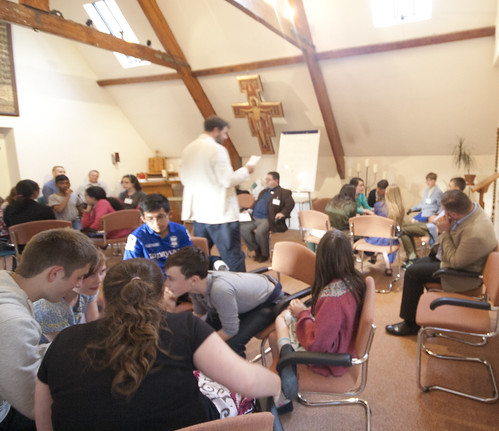 |
| Last year's Summer School - a bit of Latin is included, naturally. Details for this year are here. |
Catherine Venture (Letters, 27th May 2016) writes to promote Esperanto as an international ‘bridge’ language.
Given its steep decline in popularity in the UK, I suppose it needs all the help it can get. But since it is based on the Romance languages—the European languages derived from Latin—with a bit of Yiddish thrown in, it would be more logical to suggest studying Latin as a ‘bridge’ language, a function it actually served for many centuries.
Ms Venture objects that ‘Latin is only ok for the Classical scholar’, inviting the obvious retort the Esperanto is only ok for the Esperanto scholar. Unlike Esperanto, in which there are no Government-recognised qualifications, Latin is taught in 600 state schools, up from 100 a decade ago. Esperanto is taught in four.
No doubt Esperanto is easy to learn—at least for speakers of major European languages—but Latin was described as the ‘language of the Church’ by Pope Benedict XVI. Pope St John Paul II said it was a ‘disgrace’ not to know Latin, and that the Church has an ‘obligation’ towards it. Bl. Pope Paul VI called it a ‘divine’ language, and Pope St John XXIII praised Latin, ‘full of majesty and dignity’, precisely because, as Ms Venture says of Esperanto, it is ‘equally friendly’ to native speakers of all languages.
The Church desperately needs a common language, for communication between her children who come from every nation, culture, and language on earth. What Catholic Esperantists miss, of even greater importance, is the need for a common language of communication between the generations. It is essential for serious students of the Church’s theology, law, history, and literature, to be able to read what their predecessors wrote, in the original.
For the Church, the only possible ‘bridge language’ is Latin. It is time all Catholic schools recognised their obligation to open the door to the treasures of Catholic culture and thought to their pupils, by equipping them with Latin.
Yours faithfully,
Joseph Shaw
Chairman, The Latin Mass Society
For more on the study of Latin in the Church, see the Position Paper on Latin in Seminaries.
Support the work of the LMS by becoming an 'Anniversary Supporter'.
Church statistics: what happened to the young men?
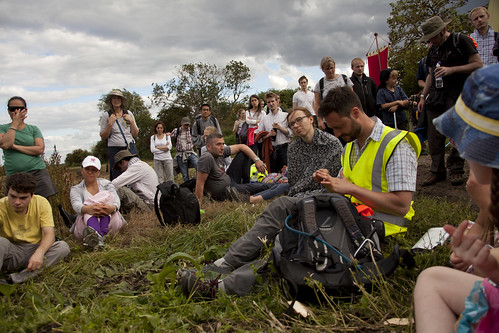 |
| A break on the LMS Walsingham Pilgrimage last year. |
In my last post I noted that the figures for lapsation from the Church given by Stephen Bullivant, which originated with the British Attitudes Survey, are systematically distorted by attitudes to Church membership and motives for getting babied baptised, which themselves vary over time and between regions. The inclusion of people in the category of 'self-identified Catholic' who have only a nominal or tribal affiliation increases the number of 'Catholics', but not the number of church-goers. If they felt that they shouldn't call themselves Catholics, the rate of practice would increase without any increase in the numbers of bums on pews. For this reason, I think that saying that 39.2% of 'Catholics' never or practically never go to Church is pretty meaningless.
More helpful is the analysis of church-goers. The age profile is one interesting thing. The small number of the youngest group, and the large number of the oldest group, is perhaps not surprising. What is a little odd is that of the four remaining age-segments, the younger two practice more than the older two. This graph is still about proportions of self-identified Catholics, but this trend is reflected in the graph (below) which zeroes in on weekly-or-more attenders. What is going on?
People who were 65 or more in 2014 (the vintage of the data) were 21 or more in 1970. The next two younger age groups were young adults or children at the time of the liturgical reform. Once we get back to people of 34 or younger, we are dealing with people who didn't experience the reform at first hand at all: they hadn't been born. Bearing in mind the liturgical and catechetical anarchy of the period between about 1965 and 1978 (the election of Pope John Paul II), I don't think it is very surprising that people who experienced this as children or very young adults were traumatised. These statistics, at any rate, show that the 'springtime of Vatican II' did nothing to draw more people into to the practice of the Faith.
Even more intriguing are the figures for sexes. I've written a lot on this blog about the lack of men in our churches, but I've been quoting statistics from the USA. Here we can see exactly what the situation is here in England and Wales.
Before anything else, we can be confident that Catholic families, on average, have as many boys as girls. If there are differences between the number of men and women among adult Catholics, it is because there is a differential lapsation rate, and to a smaller extent perhaps a different rate of conversion. (Converts account for 8% of self-described Catholics.)
First, we find that more women than men identify as Catholic: of those who call themselves Catholic, 40.9% are men and 59.1% are women.
Second, of those, the women practice more: 30.7% weekly or more, 36.1% never, the rest in between. For men it is 22.8% weekly, and 43.8% never.
Third, looking at who is actually at Mass on a weekly or more basis, fully two thirds are women, and one third are men.
Finally, look at this
graph of the sex ratio of weekly-or-more attenders, which is also broken down by age. Notice something odd about it? Not only is it skewed towards women, whose column is twice the size of men; not only does it demonstrate the large number of older women in our congregation: women over 65 make up a quarter of the typical congregation. But something else. The bottom category of the male column is missing. What happened to men aged 18-24?
The BSA survey is based on responses from 3,000 people; half of them actually took part in the survey. In this impressive sample, they found no men aged 18 to 25 who went to Catholic church once a week or more. Not one. Their set of men at that age going to church every week is empty.
Don't imagine that lots of young men are going to church slightly less frequently: as the first table above shows, whereas 14% of nominal Catholics aged 18-24 go to church weekly (presumably, these are females), only 5.3% go 'at least monthly', and if that number includes men, there aren't many of them. Obviously there are some young Catholic men who go to church. But they are statistically negligable.
At this point I need to refer back to the Position Paper I published about the Traditional Mass and men, and to my other discussions of related issues. It is demonstrable that men are turned off the liturgy and general atmosphere of the Church, but come in large numbers to the Traditional Mass and traditional devotions; traditional Catholic congregations, again, are astonishingly fertile in terms of vocations to the priesthood, and harbour large numbers of children. Come to the Chartres Pilgrimage, and you will realise that suggestions that men are simply less religious than women, or that Catholicism is intrinsically feminine, are just nonsense. It is the way the Faith is presented to young men which is the problem.
Our parishes and schools are failing Catholic boys.
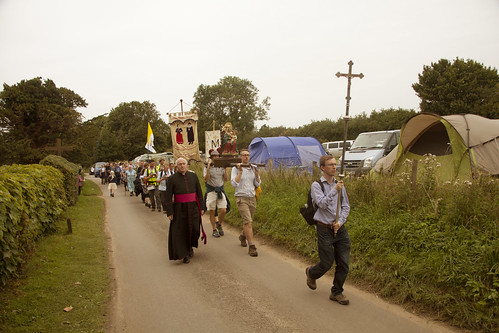 |
| Pilgrims about to enter the Shrine at Walsingham. |
Support the work of the LMS by becoming an 'Anniversary Supporter'.
Stephen Bullivant's lapsation statistics: methodological problems
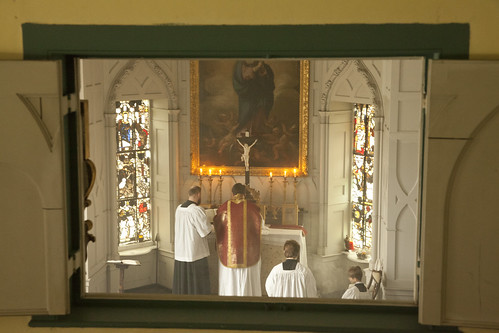 |
| A window into what is going on in the Church. |
Stephen Bullivant of the Benedict XVI Centre for Religion and Society has produced a study based on the British Social Attitudes Survey, focusing on the Catholic Church in England and Wales.
It is marred by some typographical errors, for example referring back to the wrong diagramme at one point, and saying 'somewhat under two in five [cradle Catholics] attends religious services once a week or more' (p14) when the figure is 17.1%. Thelittle video they've produced to go with it fails to explain what the percentages they are quoting are percentages of.
A general methodological point is we get individuals' views of whether they are Catholic, Anglican, or whatever, rather than any objective judgment based on belief and practice. An interesting result of this comes out with Baptists. For some reason Baptists are much less likely than Catholics and Methodists to say that they are Baptists if they aren't practicing. This means that the lapsation rate for Baptists is the highest of the groups identified: only 28.9% of cradle Baptists identify as Baptists. Conversly, the percentage of nominal Baptists who practice is also high: 58% go to church at least weekly, another 6% at least monthly. We've all met people who think of themselves as Anglicans, by contrast, even if their family has hardly set foot in church for generations. Accordingly, 51.7% of cradle Anglicans identify as Anglicans, but only 8.9% of self-identified Anglicans actually get themselves to a service once a week, with another 10% going at least once a month.
What this means--and this is something Bullivant appears not to have noticed--is that these figures are hugely influenced by attitudes to church membership: what people think it means to be an Anglican or a Baptist. The reality of how Baptists and Anglicans compare at retaining their young people is obscured by this. If Baptists suddenly decided that having a vague tribal loyalty to the Baptist milieu was enough for them to identity as Baptist, then their retention rate would shoot up and their rate of practicing would plummet. But these changes wouldn't reflect any changes in either belief or practice - except beliefs about church membership.
More helpful, then, are the figures for the church attendance of cradle Catholics. Here we find that 17.1% of cradle Catholics go to church once a week, and another 9.8% at least once a month. (56.8% of cradle Catholics identify as Catholics.) Unfortunately, this includes attendance at non-Catholic places of worship of the 6.1% cradle Catholics who have not just lapsed, but apostacised. Bullivant doesn't include comparable figures for Anglicans and others.
The trouble is, these figures are still affected by attitudes to church membership, just at one remove. What does it mean to be a 'cradle Catholic'? Baptism? Well, what does it take to get a couple to have their child baptised, and what does it take for a priest to carry out the baptism? The number of cradle Catholics who go on to lapse include those who were themselves brought up as only nomically Catholic. Children who go to a Catholic school on the basis of parents' wholly theoretical affiliation to the Church will often, presumably, say they were cradle Catholics: they were, at any rate, baptised, and probably confirmed. But you can hardly be said to lapse from the practice of the Faith if you never practiced in the first place.
Consider the debate about whether the babies of lapsed Catholics should be baptised. Parents (or godparents) have to say that the child will be brought up in the Faith. For a priest to baptise a child solely because his parents want him to go to a good school, or to please granny, is sacrilege. But how are priests to determine the good will of parents? Naturally, a range of pastoral responses are possible, and there is variation by region and over time. These variations are going to feed through into the figures for lapsation twenty years later. Laxer policies will lead to higher lapsation rates; a region of the country or period of time characterised by a stricter policy will have a lower lapsation rate. That isn't to say that a laxer policy is a bad thing: personally I agree with the Pope that priests must take parental professions of their intentions at face value, unless there are strong reasons not to do so. More nominal Catholics may, if carefully handled, lead to more real Catholics. My point is simply that the lapsation figures are being distorted by factors which have got nothing to do with how effective catechesis is, how attractive the liturgy, the social standing of the Church, and so on: the things which we may have thought we were measuring when measuring the rate of lapsation.
The baptism of children to get them into Catholic schools (or to please granny) is no marginal phenomenon in the Church in England and Wales, but of course it is impossible to estimate an accurate figure for it. What we do know is that it artificially inflates the number of nominal Catholics and the lapsation rate alike. What we really need are figures for those brought up as practicing their religion (at least, going to church), who continue to practice as adults. For this we'd need to a new study.
We do get some hints about this, however, from Bullivant's figures, and tomorrow I will address them, by looking at age and gender profiles of practicing Catholics.
Support the work of the LMS by becoming an 'Anniversary Supporter'.
The Inquisition: something everyone should expect
The latest from Lux, made for EWTN.
'The series will be premiered by EWTN in October of 2016 and is a four episode docudrama. It was filmed across Europe in 2015 and was completed in early 2016. It is perhaps our most ambitious yet with live action.'
EWTN's new docudrama series explores the history of the Inquisitions. What they were, why were they set up, and why have they acquired such a bad reputation today? Indeed if the modern media are to be believed the Inquisitions, particularly the Spanish Inquisition, are laced with images of cruelty, terror and religious fanaticism. However, these images are false, a misrepresentation developed over four centuries ago by Protestant Northern Europe as part of the propaganda campaign against the Catholic Church, and perpetuated ever since. This new four part original film was shot on location in six countries across Europe. It uses drama sequences and interviews with leading historians and churchmen to reveal the truth.
Support the work of the LMS by becoming an 'Anniversary Supporter'.
Fr Rosica: are liberal and conservative blogs cesspools of venom, hatred, and vitriol?
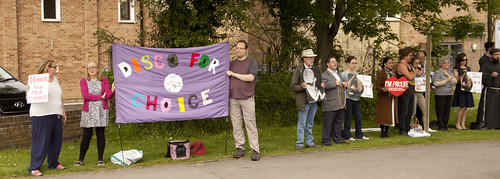 |
| Conflict is inevitable. Here is the Oxford Pro-life Witness last Saturday, with attendant counter-demonstration, who try to stop us praying by playing music. |
Never one to ignore the mote in someone else's eye, Fr Dwight Longenecker has used comments by Fr Thomas Rosica about how horrid the internet can be to attack 'traditionalists', and lists his least favourite blogs as examples.
It is interesting to note, however, that Fr Rosica does not single out traditionalists, and I think it is extremely unlikely that he has ever sampled the wares of little-read, marginal figures like Mundabor, 'Novus Ordo Watch', and 'TradCathKnight', mentioned by Longenecker. The Crux article reporting his remarks noted, instead, his conflict with 'conservative and pro-life' sites. This is Fr Rosica's description of what he doesn't like:
the obsessed, scrupulous, self-appointed, nostalgia-hankering virtual guardians of faith or of liturgical practices are very disturbed, broken and angry individuals, who never found a platform or pulpit in real life and so resort to the Internet and become trolling pontiffs and holy executioners!
1. 'The author of the piece hates Francis with a white hot passion, a fact that must be as surely known to her editors as to anyone else with a pulse capable of reading her many literary acts of voiding her rheum in the Holy Father’s face.'
2. (Talking about people attending the Traditional Mass.) [They look] like an escapee from an Amish farm. If mainstream Catholics who attend usus antiquior Masses feel as though they have landed on the set of a movie based in a nineteenth-century American mid-west or Pennsylvanian town, populated by Protestants who have a problem with modern forms of transport...
3. (Critics of female altar servers):
5. Fr Dwight Longenecker: the man himself
Support the work of the LMS by becoming an 'Anniversary Supporter'.
Dominican Missa Cantata for Bl Margaret Pole: photos
A gesture characteristic of the Dominican Rite, and not found in the Roman Rite: just after the Consecration.
Mass last Saturday was for Bl Margaret Pole, Countess of Salisbury, executed by Henry VIII out of hatred for the Catholic Faith on 28th (or 27th) May 1541. She was the daughter of George, Duke of Clarence - the one done to death in butt of wine in Shakespeare's Richard III (and, extraordinarily, probably in real life as well). Henry VII married her off to a loyal relation of his, Richard Pole, and she became lady in waiting to Catherine of Aragon, both during Catherine's engagement to Prince Arthur, who died, and when she was married to Henry VIII. Margaret's son Reginald Pole, in holy orders on the continent, wrote against the break with Rome, and two of her other sons were executed for treason (ie, Catholic sympathies).
As a Plantagenant, a Catholic, an associate of Queen Catherine, and the mother of Cardinal Pole, Henry VIII had no shortage of reasons to hate her. Nevertheless she remained in the Tower for two years before the king ordered a hasty and almost botched beheading, when she was 67.
This was the first Dominican Missa Cantata I have attended. The Epistle was sung by a cleric.
Another characteristic of the Dominican Rite: the use of the Paxbrede at the kiss of peace, for clergy, servers, and religious in choir. In the Roman Rite the Pax is normally given by the 'emplexus', embrace, but this only happens at Solemn Mass. The Roman Rite does use the Paxbrede for Prelates sitting in choir in Low Mass, and interesting the Pax is extended to the congregation using the Paxbrede in Spain and its former possessions, as was the practice in England in the Middle Ages.
Support the work of the LMS by becoming an 'Anniversary Supporter'.
Worship towards the East: video
Cardinal Robert Sarah has reopened the debate on the best 'direction' for worship, favouring the direction of 'liturgical east', the same direction as the Faithful in the nave, over 'versus populum', facing the people over the Altar like an executive facing his underlinings over a desk.
He said in an interview: “But as soon as we reach the moment when one addresses God – from the Offertory onwards – it is essential that the priest and faithful look together towards the east. This corresponds exactly to what the Council Fathers wanted.”
In honour of this occasion I repost a video recorded in 2014. To learn more on the theology and history of the debate, see the FIUV Position Paper here.
Support the work of the LMS by becoming an 'Anniversary Supporter'.
New book: God of the Gulag by Jonathan Luxmoore
 Any book shining a light on the heroic witness of those killed for their Christian faith under Communism is to be welcomed. This major two-volume work is especially so, because of its comprehensive coverage of Soviet and Soviet-bloc persecution.
Any book shining a light on the heroic witness of those killed for their Christian faith under Communism is to be welcomed. This major two-volume work is especially so, because of its comprehensive coverage of Soviet and Soviet-bloc persecution.
Well done to Jonathan Luxmoore, otherwise known for his occasional news stories in the Catholic press. The publication of this work marks the culmination of a massive project of research and writing.
The book is available from Amazon (Vol 1, Vol 2) and directly from Gracewing.
----------------------------------
God of the Gulag, by Jonathan Luxmoore
Volume 1: Martyrs in an Age of Revolution
The eight decades from the Bolshevik Revolution to the collapse of the Iron Curtain brought a wave of anti-religious repression comparable to anything seen in the fabled persecutions of the first Christian centuries. It inflicted sufferings and agonies equalling those of the darkest periods; and it stimulated writings and reflections paralleling the most insightful and moving from Christian history. This first volume of The God of the Gulag shows how the paradigms of persecution and martyrdom were established in the Early Church, when Christians were hounded by the Roman state as a threat to the established order-and how they reappeared when anti-Christian persecution returned on a mass scale after the French Revolution, as new hostile states and popular movements tried again to dismantle the power and influence of the Christian Church. Drawing on accounts and documents in many languages, it examines the first phase of communist rule after the 1917 Russian revolution, when a ruthless campaign was launched to destroy all organised religion and redirect spiritual strivings towards an absolute subservience to the Marxist vision. It looks at how Christians attempted to defend the Church and witness to their faith as the communist dictatorship was extended under Stalin to post-War Eastern Europe, bringing a new wave of arrests, trials and purges.
9780852446393 - 536 pages £20.00

Volume 2: Martyrs in an Age of Secularism
By the end of the 1950s, more than four decades had passed since Lenin and his Bolshevik followers had first seized power in Russia. Open brutality and terror had given way to administrative forms of repression and control. But the aim of communism was still very much alive-to create an egalitarian society ruled by the working class under the direction of the Party avant-garde. Intimidation and coercion by the secret police were still indispensable tools for pursuing that aim. Hostility to the Church and contempt for religious faith were still fundamental to the communist programme. This second volume of The God of the Gulag details the continuing campaign against the Church and its members, as the age of revolution gave way to an age of secularism, and new efforts were made to impose scientific atheism and rid the world of religious superstition. Drawing on accounts and documents in many languages, it shows how the requirements of Christian witness evolved as the policies and tactics of the one-party state developed, and how Church leaders sought new ways of sustaining religious life after the 1962-5 Second Vatican Council. It recounts how growing dissent was strengthened by the shock-election of a Polish Pope in 1978 and the rise of the Solidarity movement two years later, and how the bitter and protracted endgame of communist rule was played out in the 1980s. It assesses the lessons to be learned by the Church and its opponents from this modern era of persecution and martyrdom; and it looks at how the heroic testimony of the twentieth-century martyrs should be recognised and commemorated.
9780852445846 - 484 pages £20.00
Support the work of the LMS by becoming an 'Anniversary Supporter'.
Video of Cardinal Burke celebrating Low Mass in Oxford
I posted a number of photos here; I have finally posted up a short video, including snatches of the very lovely music sung on this occasion.
Support the work of the LMS by becoming an 'Anniversary Supporter'.

